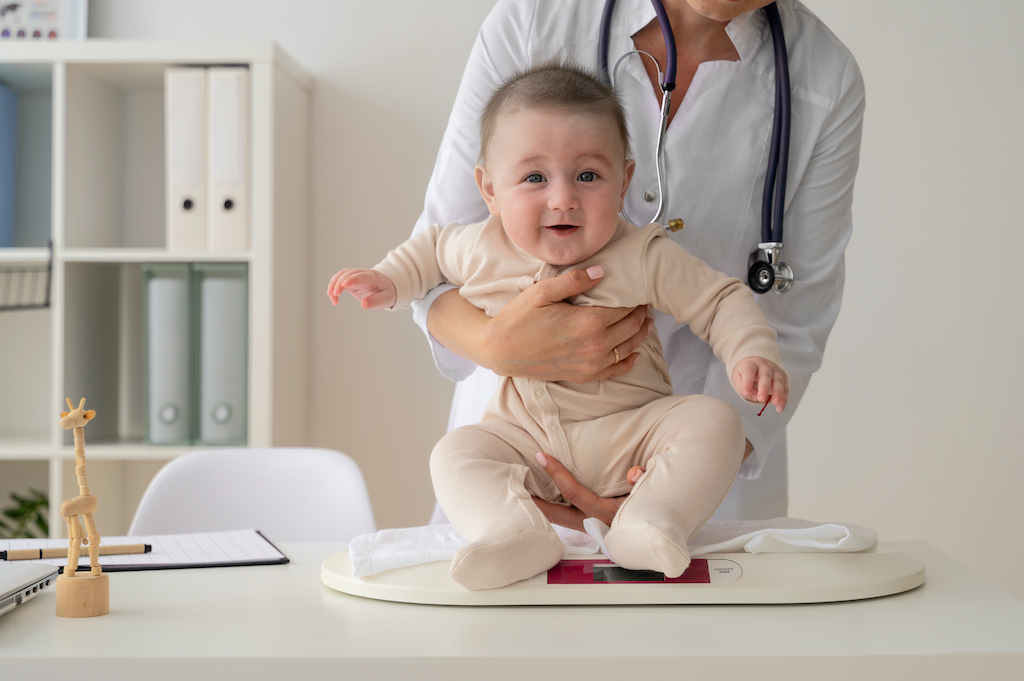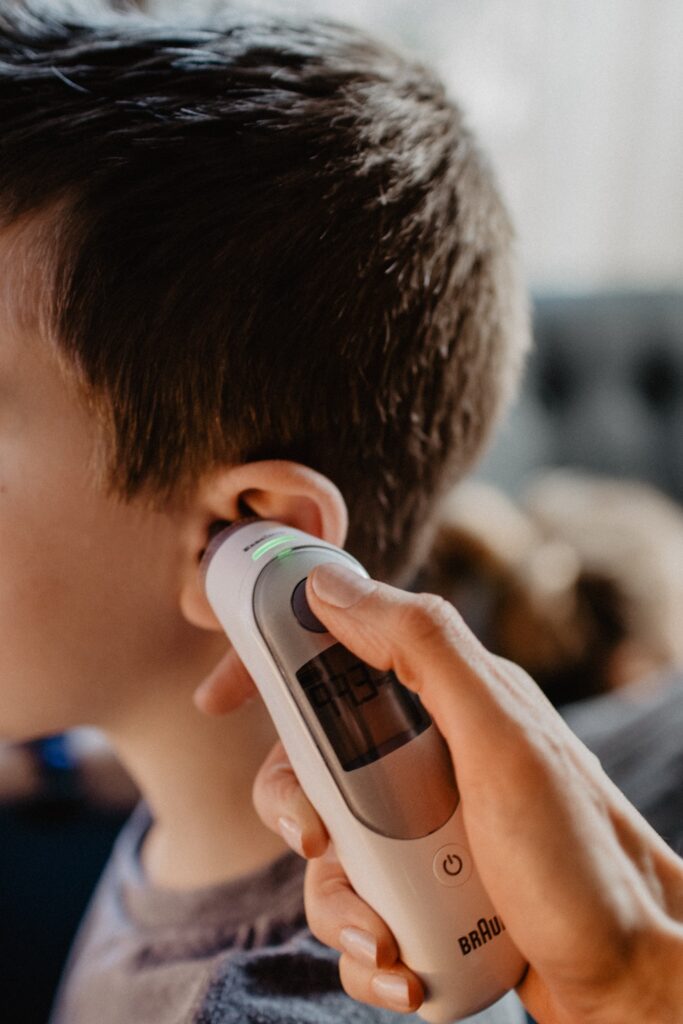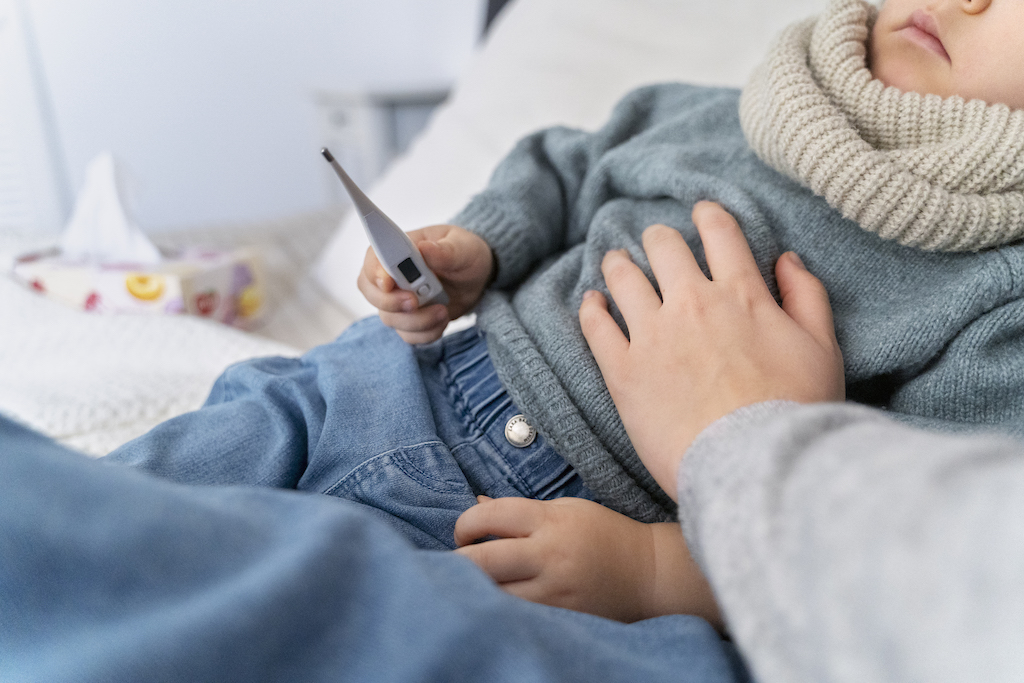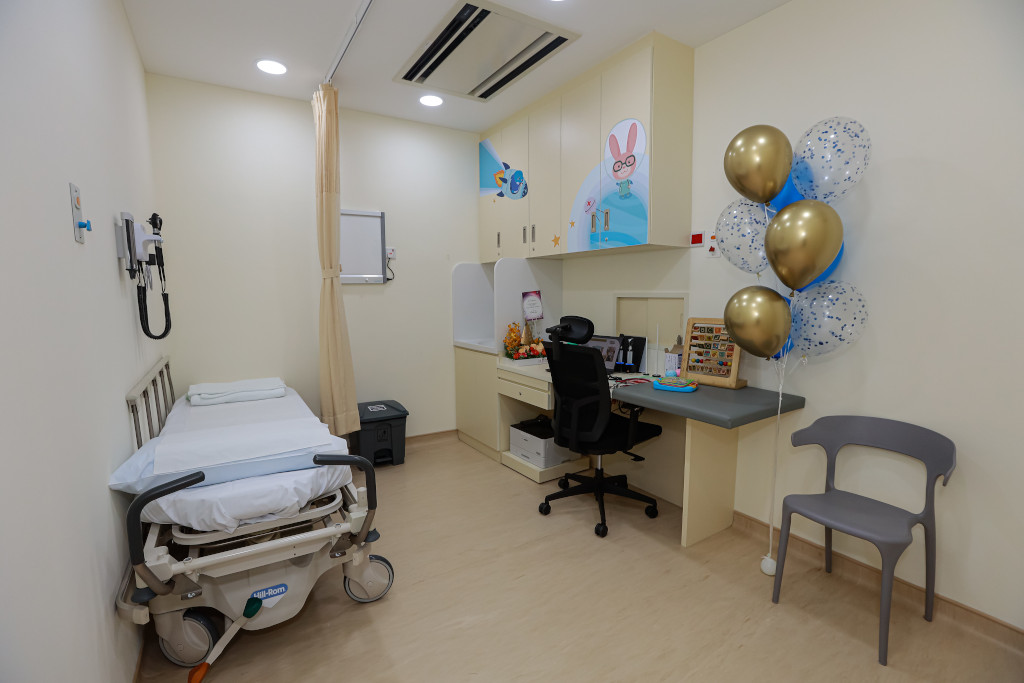SingaporeMotherhood | Baby & Toddler
December 2023
Does your Child have a Medical Emergency? Bring them to the Paediatric Urgent Care Centre at Parkway East Hospital

After a long day at work, you are looking forward to spending some quality time bonding with your family over dinner. But you arrive home only to find that your child has had a medical emergency — it could be a broken bone, a severe allergy reaction leading to breathing difficulties, or a wound that won’t stop bleeding — that requires immediate attention. Worse, the clinic that your family usually goes to is already closed for the day.
Thankfully, you know that you can bring your child to the Paediatric Urgent Care Centre at Parkway East Hospital, as it operates beyond usual clinic hours to treat paediatric medical emergencies. Newly opened on 4 December 2023, the Paediatric Urgent Care Centre has a dedicated team of expert paediatricians and emergency care staff to ensure that every young patient receives the best care and treatment.
Best of all, your child will not have to wait long for a consultation. Because the Paediatric Urgent Care Centre is just like an A&E in a private hospital (just that it’s dedicated to little ones!) there is a shorter wait time — averaging around 30 minutes — as compared to the public hospitals, to see a paediatric specialist.
(See also: 6 MOST COMMON REASONS WHY CHILDREN IN SINGAPORE END UP IN THE A&E)
However, not every ailment warrants a visit to the Urgent Care Centre. When then, is a condition considered severe enough to require urgent care? Read on to find out.

When you may need to bring your child to the Paediatric Urgent Care Centre
1. Abdominal Pain
➜ Go to the urgent care centre if your child:
- Says the pain is getting worse, and the pain is in a specific part of the abdomen
- Has been having a fever for 5 days or more
- Is vomiting and unable to tolerate even a small amount of fluids, the vomit is green in colour, or contains blood
- Has poor urine output (e.g. dry diapers or with very little but concentrated urine)
- Has watery diarrhoea, even though your child has not been eating or drinking much
- Has blood in the stools
- Is drowsy, but has no fever, is lethargic, and not interested in playing or engaging with you
2. Allergic Reaction
➜ Go to the urgent care centre if your child:
- Has skin rashes that are getting worse (e.g. hives)
- Is having swelling in the lips, face, and area around the eyes
- Finds it difficult to breathe and has pale or bluish lips and tongue
- Has difficulties in swallowing, and feels that there is a choking sensation, or sensation of a lump in the throat
- Has heart palpitations, or chest tightness
- Feels dizzy, light-headed or has fainting spells
- Has abdominal pain, nausea or vomiting, and diarrhoea
(See also: GAUCHER DISEASE: RARE, BUT DANGEROUS, ESPECIALLY FOR INFANTS AND CHILDREN)
3. Cough
➜ Go to the urgent care centre if your child:
- Is breathing heavily or rapidly, and has chest tightness or discomfort
- Is breathless and unable to speak, or can only speak in very short phrases
- Had fever for 5 days or more
- Is vomiting a lot
- Has poor oral intake, even with fluids or milk
- Has poor urine output
- Is drowsy or lethargic, and looks dazed
- Is woken up repeatedly by bouts of coughing
4. Head Injuries
➜ Go to the urgent care centre if your child:
- Fell from height, especially if the height is 3 times or more than that of the child
- Lost consciousness, even if only for a brief period
- Is vomiting, feels dizzy, and has a worsening headache, blurred vision, slurred speech, looks dazed, and is drowsy
- Is unable to walk or keep his/her balance
- Has blood or fluid flowing from the nose or ears, or wounds on the face or scalp
5. High Fever
A fever is an increased body temperature of 37.4°C or above. It is the body’s natural response when fighting an infection. In children, it is common to see high temperatures of up to 40°C. Having a higher temperature does not indicate a more severe illness. However, for infants and toddlers, a fever may suggest a serious infection.

➜ Go to the urgent care centre if your child:
- Has a temperature of 38°C or more (for infants under 3 months)
- Has a temperature of 40°C or more (for infants 3 months and above)
- Had a high fever for 3 days or more
- Is drowsy and lethargic, even though the fever seems to be getting better
- Has poor oral intake, even with fluids or milk
- Has poor urine output (e.g. dry diapers or with very little yet concentrated urine)
- Is breathing heavily or rapidly, and looking breathless
- Is pale-looking, has bruising of skin, or is bleeding from the nose or gums
6. Lacerations and Wounds
Cuts and lacerations refer to tears or openings in the skin, often caused by sharp, edged objects like kitchen knives, razor blades and scissors. Such wounds can cause significant bleeding. Other types of open wounds include abrasions, punctures, and avulsions. If your child’s injury is wide, jagged, or deep with persistent bleeding, seek medical attention immediately.
➜ Go to the urgent care centre if your child:
- Is still bleeding despite continued application of direct pressure
- Has deep puncture wounds or gaping wounds, and pus discharge from the injured areas
- Has wounds near or involving the eyes, ears, nose, mouth and neck
- Has limb wounds that affect function (e.g. unable to flex or extend finger)
- Has heavily contaminated wounds (e.g. soil, sand, glass, pond or drain water)
- Got animal bites or claw injuries
- Is feeling more and more pain at injured areas
(See also: BABY’S CRYING AND VOMITING NON-STOP. COULD IT BE INTUSSUSCEPTION?)
7. Fractures and other Orthopaedic conditions
A fracture occurs when a bone is cracked or broken due to excessive force or pressure, and any bone in the body may break. Typically the result of an injury, it may be a partial or complete fracture, with varying degrees of severity. Fractures in children are a common occurrence, and may be caused by falls or sports injuries. If you think your child’s foot, ankle, or other body part is broken, bring them to the Urgent Care Centre for immediate medical attention.
➜ Go to the urgent care centre if your child:
- Has exposed bone (i.e. open fracture), or there is a deformity of the bone or joint
- Has increased swelling and/or bruising of a joint
- Cannot function (e.g. unable to flex or extend finger) because of the wound
8. Food Poisoning
This usually results in unexpected and sudden symptoms, especially if the child’s caregiver did not witness the incident. Seek medical attention immediately. Do not wait for symptoms to develop or worsen, and do not deliberately induce vomiting.

➜ Go to the urgent care centre if your child:
- Is drowsy, lethargic, dizzy, unconscious, or vomiting
- Has seizures, chest pain or discomfort, or worsening throat or abdominal pain
- Is breathing rapidly or breathless, or shallow breathing with pauses
9. Scalds and Burn injuries
All scalds and burn injuries, unless very mild (e.g. first degree) and involving a small area, should be reviewed by a doctor.
➜ Go to the urgent care centre if your child:
- Has blisters and the affected skin is peeling off
- Is injured over a large area (i.e. anything more than the surface area of the child’s palm)
- Has an injury on the the face, neck, hands, feet or genitalia
- Has a persistent fever
- Feels worsening pain in injured areas, and has pus discharge from injured areas
In the event that your child was trapped in a room which caught fire, it’s crucial to seek immediate medical attention if you observe any of the following symptoms:
- Hoarse voice
- Soot in nostrils or throat
- Singed eyebrows
- Drowsiness
10. Seizures / Fits
➜ Go to the urgent care centre if your child:
- Had a fit for the first time (with or without fever), the fit lasted 5 minutes or longer, or it happened after a fall, or head injury
- Had prolonged drowsiness for 30 minutes or longer
- Has slurred speech, is unable to move a part of their body, is dazed, and not recognising caregivers
- Is not breathing, or has blue-looking lips/tongue, during or after the seizures
(See also: INS AND OUTS OF GASTROENTERITIS IN BABIES AND CHILDREN)
11. Gastroenteritis
Also known as the stomach flu, gastroenteritis is an infection of your child’s stomach and intestines that may lead to diarrhoea, vomiting, or both.
➜ Go to the urgent care centre if your child:
- Has green vomit, and blood in the vomit or stools, continuous vomiting and inability to keep down any fluids
- A fever of more than 38°C
- Diarrhoea for more than 2 weeks
- Drowsiness or increased lethargy
- Severe or prolonged episodes of abdominal pain
- A sunken fontanelle (the soft spot on top of the skull)
- Large amounts of watery diarrhoea (more than 8 – 10 times a day)
- Signs of dehydration such as poor urine output, dry lips or tongue, sunken eyes

For more details about conditions that require treatment at the Paediatric Urgent Care Centre, go to Parkway East Hospital’s Children Emergencies webpage here.
Parents’ must-know: the Paediatric Urgent Care Centre at Parkway East Hospital
Just remember, there’s no need to panic if your child has a medical emergency outside of regular doctor hours. Just keep your little one (and yourself!) calm, and bring them to Paediatric Urgent Care Centre at Parkway East Hospital, where they can get a consultation from a paediatric doctor in as little as 30 minutes, and be on their way to recovery soon!
If your child is experiencing any of the above symptoms, bring them to the Parkway East Paediatric Urgent Care Centre at Parkway East Hospital for prompt care from a paediatric specialist.📍321 Joo Chiat Place, Singapore 427990 ⏰ Parkway East Paediatric Urgent Care Centre closes at 11pm daily.
This post is brought to you by IHH Healthcare Singapore.
Featured image: jcomp on Freepik
All content from this article, including images, cannot be reproduced without credits or written permission from SingaporeMotherhood.
Follow us on Facebook, Instagram, and Telegram for the latest article and promotion updates.





